Memoir on Embracing Diversity and Refuting Stereotypes
VerifiedAdded on 2022/11/07
|5
|1475
|350
AI Summary
This memoir focuses on the importance of embracing diversity and refuting stereotypes in our society. It tells the story of a young boy who befriends an African family in Qatar and learns to appreciate their culture and language. The memoir also discusses the need to eliminate misconceptions and promote cultural diversity.
Contribute Materials
Your contribution can guide someone’s learning journey. Share your
documents today.
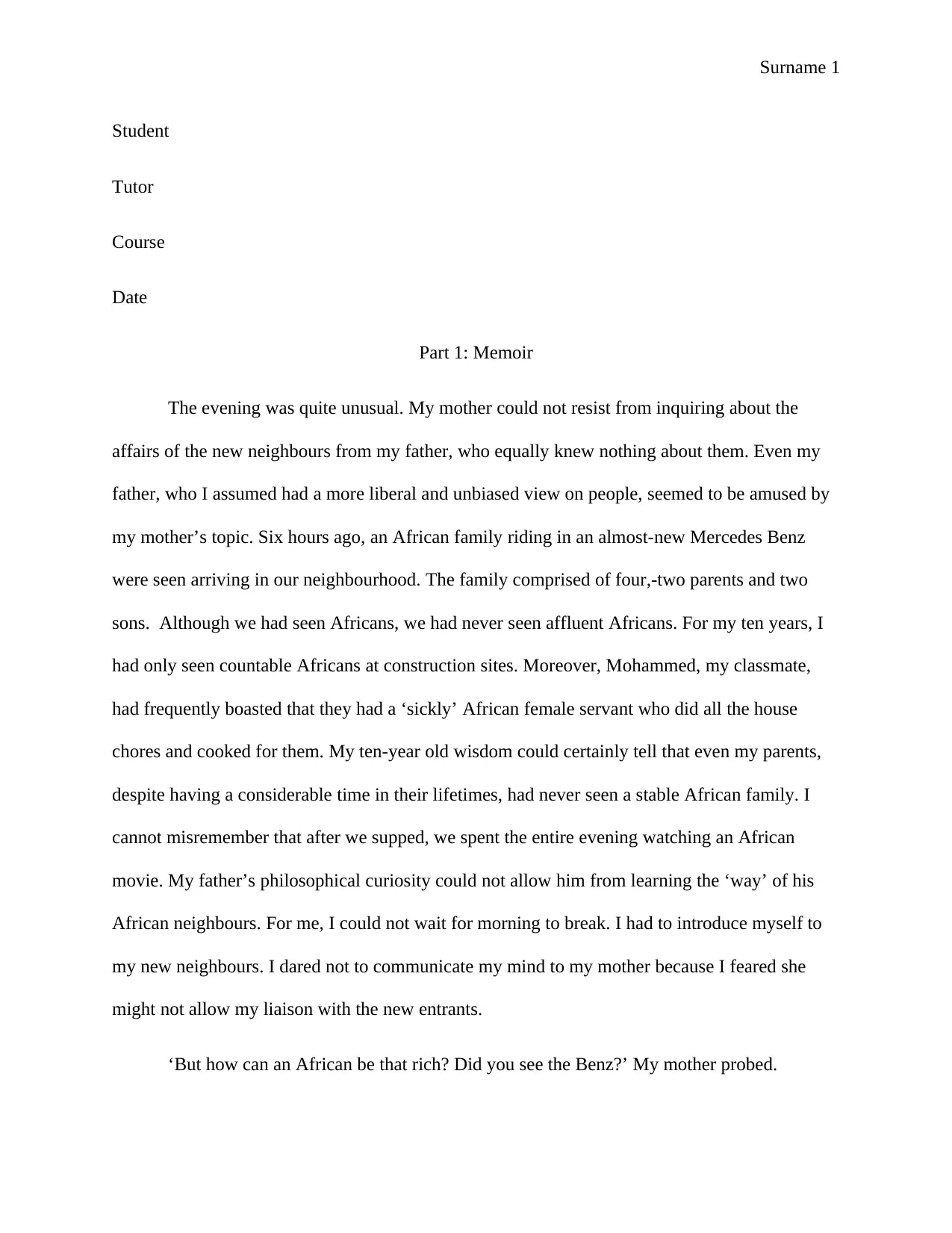
Surname 1
Student
Tutor
Course
Date
Part 1: Memoir
The evening was quite unusual. My mother could not resist from inquiring about the
affairs of the new neighbours from my father, who equally knew nothing about them. Even my
father, who I assumed had a more liberal and unbiased view on people, seemed to be amused by
my mother’s topic. Six hours ago, an African family riding in an almost-new Mercedes Benz
were seen arriving in our neighbourhood. The family comprised of four,-two parents and two
sons. Although we had seen Africans, we had never seen affluent Africans. For my ten years, I
had only seen countable Africans at construction sites. Moreover, Mohammed, my classmate,
had frequently boasted that they had a ‘sickly’ African female servant who did all the house
chores and cooked for them. My ten-year old wisdom could certainly tell that even my parents,
despite having a considerable time in their lifetimes, had never seen a stable African family. I
cannot misremember that after we supped, we spent the entire evening watching an African
movie. My father’s philosophical curiosity could not allow him from learning the ‘way’ of his
African neighbours. For me, I could not wait for morning to break. I had to introduce myself to
my new neighbours. I dared not to communicate my mind to my mother because I feared she
might not allow my liaison with the new entrants.
‘But how can an African be that rich? Did you see the Benz?’ My mother probed.
Student
Tutor
Course
Date
Part 1: Memoir
The evening was quite unusual. My mother could not resist from inquiring about the
affairs of the new neighbours from my father, who equally knew nothing about them. Even my
father, who I assumed had a more liberal and unbiased view on people, seemed to be amused by
my mother’s topic. Six hours ago, an African family riding in an almost-new Mercedes Benz
were seen arriving in our neighbourhood. The family comprised of four,-two parents and two
sons. Although we had seen Africans, we had never seen affluent Africans. For my ten years, I
had only seen countable Africans at construction sites. Moreover, Mohammed, my classmate,
had frequently boasted that they had a ‘sickly’ African female servant who did all the house
chores and cooked for them. My ten-year old wisdom could certainly tell that even my parents,
despite having a considerable time in their lifetimes, had never seen a stable African family. I
cannot misremember that after we supped, we spent the entire evening watching an African
movie. My father’s philosophical curiosity could not allow him from learning the ‘way’ of his
African neighbours. For me, I could not wait for morning to break. I had to introduce myself to
my new neighbours. I dared not to communicate my mind to my mother because I feared she
might not allow my liaison with the new entrants.
‘But how can an African be that rich? Did you see the Benz?’ My mother probed.
Secure Best Marks with AI Grader
Need help grading? Try our AI Grader for instant feedback on your assignments.
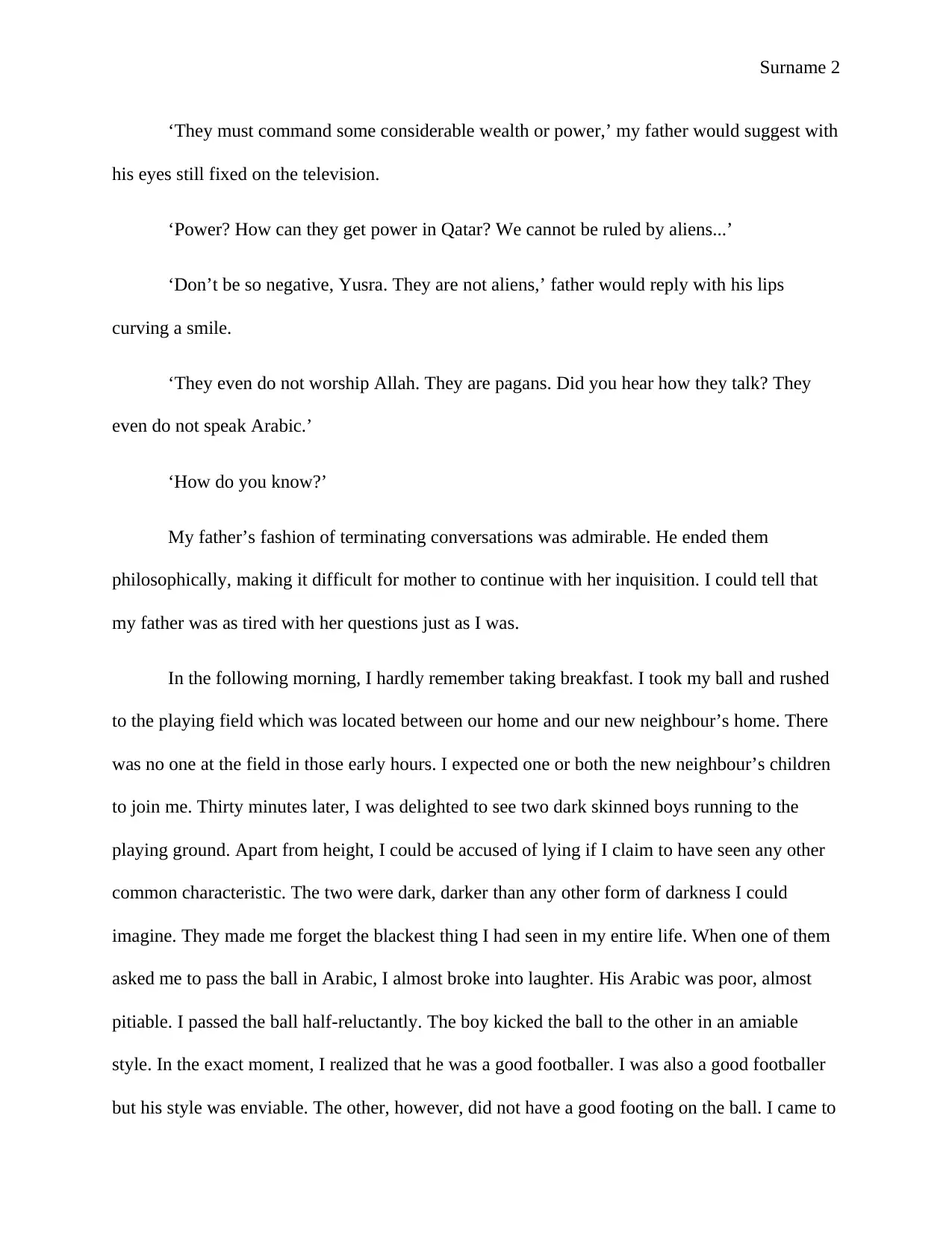
Surname 2
‘They must command some considerable wealth or power,’ my father would suggest with
his eyes still fixed on the television.
‘Power? How can they get power in Qatar? We cannot be ruled by aliens...’
‘Don’t be so negative, Yusra. They are not aliens,’ father would reply with his lips
curving a smile.
‘They even do not worship Allah. They are pagans. Did you hear how they talk? They
even do not speak Arabic.’
‘How do you know?’
My father’s fashion of terminating conversations was admirable. He ended them
philosophically, making it difficult for mother to continue with her inquisition. I could tell that
my father was as tired with her questions just as I was.
In the following morning, I hardly remember taking breakfast. I took my ball and rushed
to the playing field which was located between our home and our new neighbour’s home. There
was no one at the field in those early hours. I expected one or both the new neighbour’s children
to join me. Thirty minutes later, I was delighted to see two dark skinned boys running to the
playing ground. Apart from height, I could be accused of lying if I claim to have seen any other
common characteristic. The two were dark, darker than any other form of darkness I could
imagine. They made me forget the blackest thing I had seen in my entire life. When one of them
asked me to pass the ball in Arabic, I almost broke into laughter. His Arabic was poor, almost
pitiable. I passed the ball half-reluctantly. The boy kicked the ball to the other in an amiable
style. In the exact moment, I realized that he was a good footballer. I was also a good footballer
but his style was enviable. The other, however, did not have a good footing on the ball. I came to
‘They must command some considerable wealth or power,’ my father would suggest with
his eyes still fixed on the television.
‘Power? How can they get power in Qatar? We cannot be ruled by aliens...’
‘Don’t be so negative, Yusra. They are not aliens,’ father would reply with his lips
curving a smile.
‘They even do not worship Allah. They are pagans. Did you hear how they talk? They
even do not speak Arabic.’
‘How do you know?’
My father’s fashion of terminating conversations was admirable. He ended them
philosophically, making it difficult for mother to continue with her inquisition. I could tell that
my father was as tired with her questions just as I was.
In the following morning, I hardly remember taking breakfast. I took my ball and rushed
to the playing field which was located between our home and our new neighbour’s home. There
was no one at the field in those early hours. I expected one or both the new neighbour’s children
to join me. Thirty minutes later, I was delighted to see two dark skinned boys running to the
playing ground. Apart from height, I could be accused of lying if I claim to have seen any other
common characteristic. The two were dark, darker than any other form of darkness I could
imagine. They made me forget the blackest thing I had seen in my entire life. When one of them
asked me to pass the ball in Arabic, I almost broke into laughter. His Arabic was poor, almost
pitiable. I passed the ball half-reluctantly. The boy kicked the ball to the other in an amiable
style. In the exact moment, I realized that he was a good footballer. I was also a good footballer
but his style was enviable. The other, however, did not have a good footing on the ball. I came to
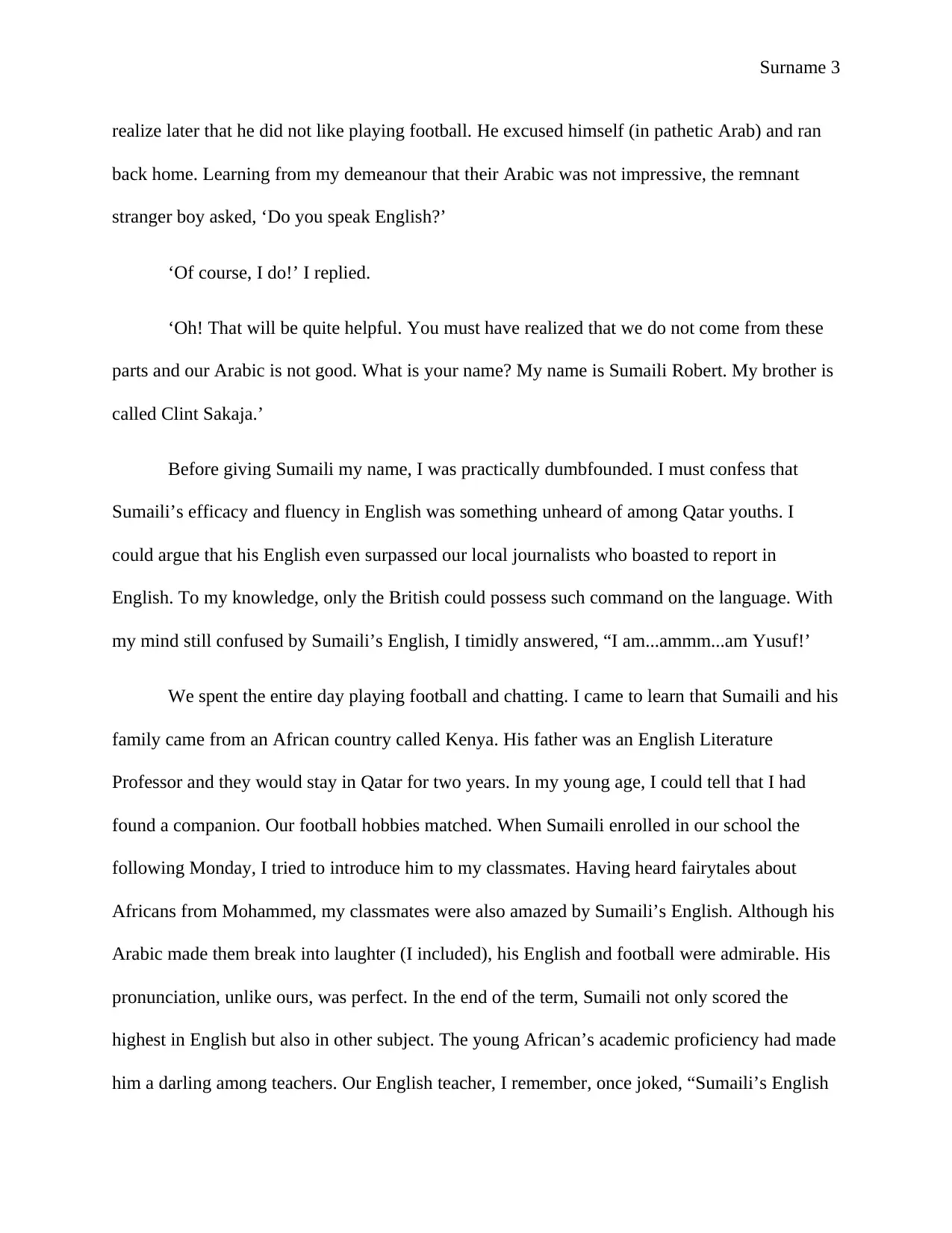
Surname 3
realize later that he did not like playing football. He excused himself (in pathetic Arab) and ran
back home. Learning from my demeanour that their Arabic was not impressive, the remnant
stranger boy asked, ‘Do you speak English?’
‘Of course, I do!’ I replied.
‘Oh! That will be quite helpful. You must have realized that we do not come from these
parts and our Arabic is not good. What is your name? My name is Sumaili Robert. My brother is
called Clint Sakaja.’
Before giving Sumaili my name, I was practically dumbfounded. I must confess that
Sumaili’s efficacy and fluency in English was something unheard of among Qatar youths. I
could argue that his English even surpassed our local journalists who boasted to report in
English. To my knowledge, only the British could possess such command on the language. With
my mind still confused by Sumaili’s English, I timidly answered, “I am...ammm...am Yusuf!’
We spent the entire day playing football and chatting. I came to learn that Sumaili and his
family came from an African country called Kenya. His father was an English Literature
Professor and they would stay in Qatar for two years. In my young age, I could tell that I had
found a companion. Our football hobbies matched. When Sumaili enrolled in our school the
following Monday, I tried to introduce him to my classmates. Having heard fairytales about
Africans from Mohammed, my classmates were also amazed by Sumaili’s English. Although his
Arabic made them break into laughter (I included), his English and football were admirable. His
pronunciation, unlike ours, was perfect. In the end of the term, Sumaili not only scored the
highest in English but also in other subject. The young African’s academic proficiency had made
him a darling among teachers. Our English teacher, I remember, once joked, “Sumaili’s English
realize later that he did not like playing football. He excused himself (in pathetic Arab) and ran
back home. Learning from my demeanour that their Arabic was not impressive, the remnant
stranger boy asked, ‘Do you speak English?’
‘Of course, I do!’ I replied.
‘Oh! That will be quite helpful. You must have realized that we do not come from these
parts and our Arabic is not good. What is your name? My name is Sumaili Robert. My brother is
called Clint Sakaja.’
Before giving Sumaili my name, I was practically dumbfounded. I must confess that
Sumaili’s efficacy and fluency in English was something unheard of among Qatar youths. I
could argue that his English even surpassed our local journalists who boasted to report in
English. To my knowledge, only the British could possess such command on the language. With
my mind still confused by Sumaili’s English, I timidly answered, “I am...ammm...am Yusuf!’
We spent the entire day playing football and chatting. I came to learn that Sumaili and his
family came from an African country called Kenya. His father was an English Literature
Professor and they would stay in Qatar for two years. In my young age, I could tell that I had
found a companion. Our football hobbies matched. When Sumaili enrolled in our school the
following Monday, I tried to introduce him to my classmates. Having heard fairytales about
Africans from Mohammed, my classmates were also amazed by Sumaili’s English. Although his
Arabic made them break into laughter (I included), his English and football were admirable. His
pronunciation, unlike ours, was perfect. In the end of the term, Sumaili not only scored the
highest in English but also in other subject. The young African’s academic proficiency had made
him a darling among teachers. Our English teacher, I remember, once joked, “Sumaili’s English
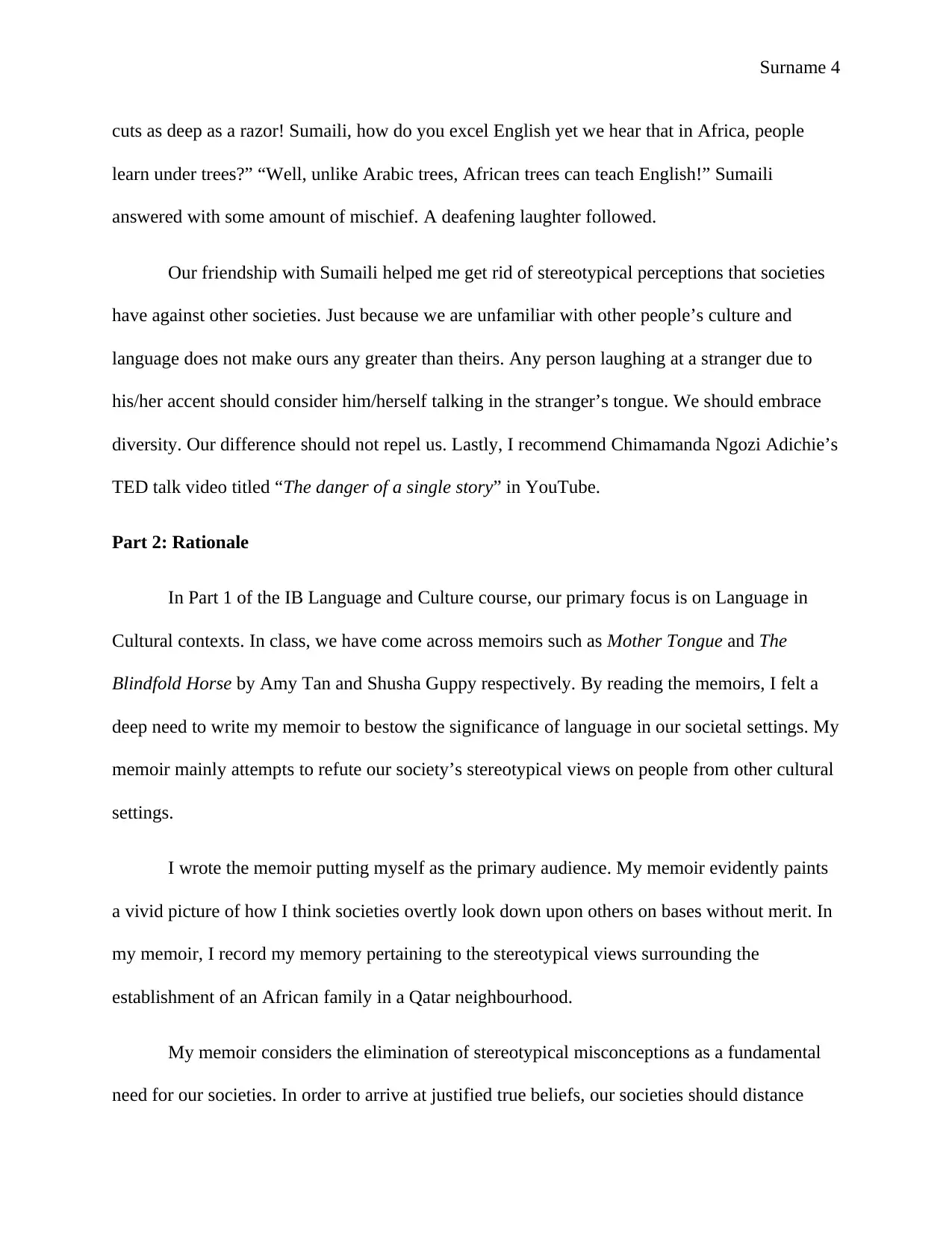
Surname 4
cuts as deep as a razor! Sumaili, how do you excel English yet we hear that in Africa, people
learn under trees?” “Well, unlike Arabic trees, African trees can teach English!” Sumaili
answered with some amount of mischief. A deafening laughter followed.
Our friendship with Sumaili helped me get rid of stereotypical perceptions that societies
have against other societies. Just because we are unfamiliar with other people’s culture and
language does not make ours any greater than theirs. Any person laughing at a stranger due to
his/her accent should consider him/herself talking in the stranger’s tongue. We should embrace
diversity. Our difference should not repel us. Lastly, I recommend Chimamanda Ngozi Adichie’s
TED talk video titled “The danger of a single story” in YouTube.
Part 2: Rationale
In Part 1 of the IB Language and Culture course, our primary focus is on Language in
Cultural contexts. In class, we have come across memoirs such as Mother Tongue and The
Blindfold Horse by Amy Tan and Shusha Guppy respectively. By reading the memoirs, I felt a
deep need to write my memoir to bestow the significance of language in our societal settings. My
memoir mainly attempts to refute our society’s stereotypical views on people from other cultural
settings.
I wrote the memoir putting myself as the primary audience. My memoir evidently paints
a vivid picture of how I think societies overtly look down upon others on bases without merit. In
my memoir, I record my memory pertaining to the stereotypical views surrounding the
establishment of an African family in a Qatar neighbourhood.
My memoir considers the elimination of stereotypical misconceptions as a fundamental
need for our societies. In order to arrive at justified true beliefs, our societies should distance
cuts as deep as a razor! Sumaili, how do you excel English yet we hear that in Africa, people
learn under trees?” “Well, unlike Arabic trees, African trees can teach English!” Sumaili
answered with some amount of mischief. A deafening laughter followed.
Our friendship with Sumaili helped me get rid of stereotypical perceptions that societies
have against other societies. Just because we are unfamiliar with other people’s culture and
language does not make ours any greater than theirs. Any person laughing at a stranger due to
his/her accent should consider him/herself talking in the stranger’s tongue. We should embrace
diversity. Our difference should not repel us. Lastly, I recommend Chimamanda Ngozi Adichie’s
TED talk video titled “The danger of a single story” in YouTube.
Part 2: Rationale
In Part 1 of the IB Language and Culture course, our primary focus is on Language in
Cultural contexts. In class, we have come across memoirs such as Mother Tongue and The
Blindfold Horse by Amy Tan and Shusha Guppy respectively. By reading the memoirs, I felt a
deep need to write my memoir to bestow the significance of language in our societal settings. My
memoir mainly attempts to refute our society’s stereotypical views on people from other cultural
settings.
I wrote the memoir putting myself as the primary audience. My memoir evidently paints
a vivid picture of how I think societies overtly look down upon others on bases without merit. In
my memoir, I record my memory pertaining to the stereotypical views surrounding the
establishment of an African family in a Qatar neighbourhood.
My memoir considers the elimination of stereotypical misconceptions as a fundamental
need for our societies. In order to arrive at justified true beliefs, our societies should distance
Secure Best Marks with AI Grader
Need help grading? Try our AI Grader for instant feedback on your assignments.
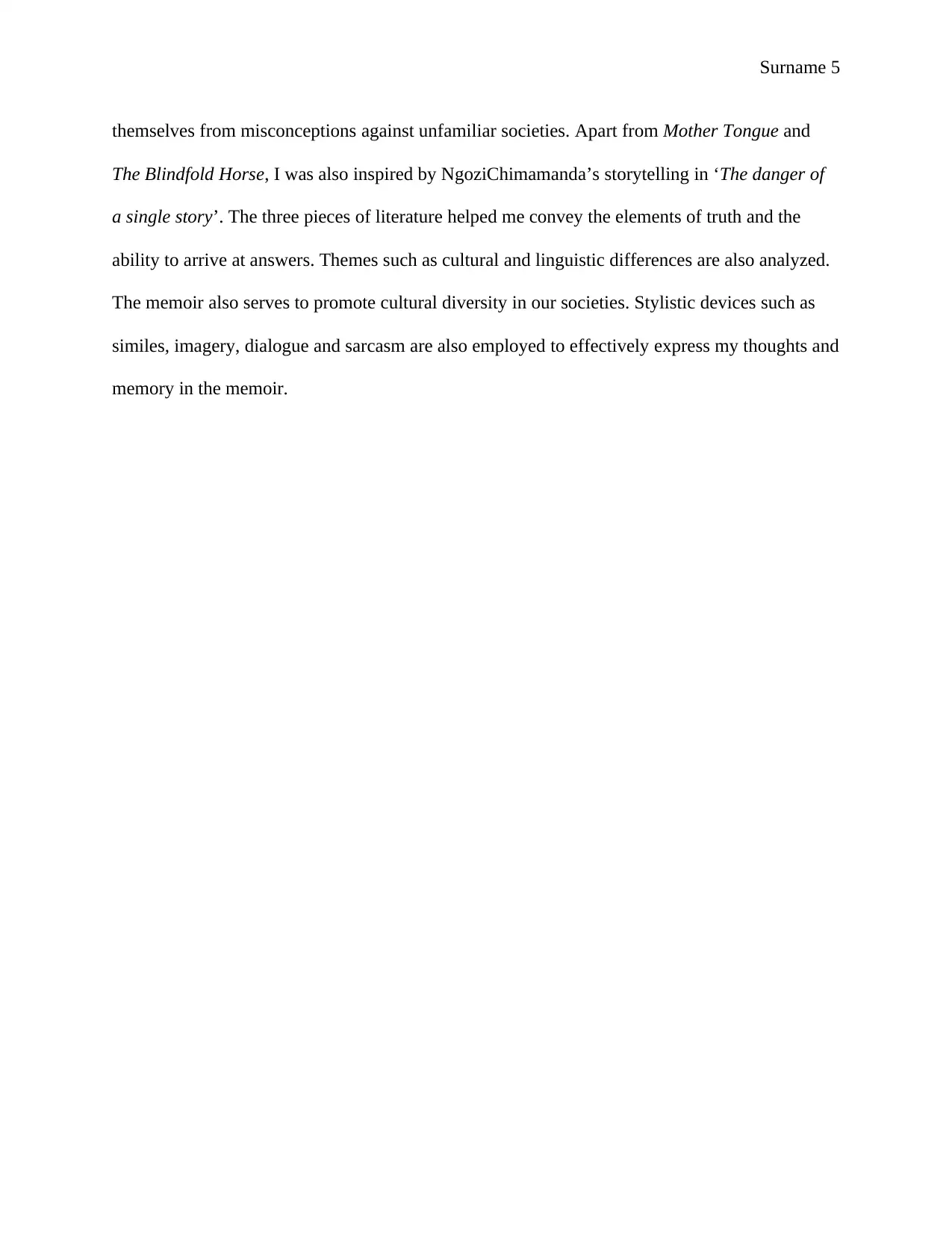
Surname 5
themselves from misconceptions against unfamiliar societies. Apart from Mother Tongue and
The Blindfold Horse, I was also inspired by NgoziChimamanda’s storytelling in ‘The danger of
a single story’. The three pieces of literature helped me convey the elements of truth and the
ability to arrive at answers. Themes such as cultural and linguistic differences are also analyzed.
The memoir also serves to promote cultural diversity in our societies. Stylistic devices such as
similes, imagery, dialogue and sarcasm are also employed to effectively express my thoughts and
memory in the memoir.
themselves from misconceptions against unfamiliar societies. Apart from Mother Tongue and
The Blindfold Horse, I was also inspired by NgoziChimamanda’s storytelling in ‘The danger of
a single story’. The three pieces of literature helped me convey the elements of truth and the
ability to arrive at answers. Themes such as cultural and linguistic differences are also analyzed.
The memoir also serves to promote cultural diversity in our societies. Stylistic devices such as
similes, imagery, dialogue and sarcasm are also employed to effectively express my thoughts and
memory in the memoir.
1 out of 5
Related Documents
Your All-in-One AI-Powered Toolkit for Academic Success.
+13062052269
info@desklib.com
Available 24*7 on WhatsApp / Email
![[object Object]](/_next/static/media/star-bottom.7253800d.svg)
Unlock your academic potential
© 2024 | Zucol Services PVT LTD | All rights reserved.




